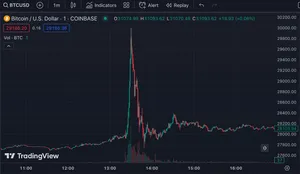Meanwhile, the founder of the Nostr social media platform has accused Nostr Assets of being an "affinity scam" by falsely suggesting in their platform name and $NOSTR token naming they are affiliated with the Nostr project. Nostr Assets has described the allegations as "unfounded", saying that their use of the Nostr network means the name is "pertinent", and suggesting that Nostr's founder has no basis to dictate who can use the Nostr name as it is a decentralized and open source project.
Nostr Assets gets clogged up
Bitcoiner spends $3 million on transaction fee
A person then claimed on Twitter to be the owner of the wallet, verifying the claim by signing a message from the wallet that paid the fee. They claimed that they had been hacked, and that an error on the attacker's part led to the huge fee payment. AntPool, the mining pool that mined that block and earned the huge fee, later agreed to return the fee, though it's not clear if or how they verified that the person to whom they're returning the fee wasn't in fact the attacker who had obtained control of the wallet.
A similar fee overpayment incident occurred in September, when the Paxos crypto firm erroneously paid a $500,000 fee to send $1,865. They attributed the huge fee to a bug in their software, and the F2Pool mining pool (who had mined the block and received the fee) opted to return the overpayment.
Up to $1 billion stored in early Bitcoin wallets may be at risk due to "Randstorm" vulnerability
Unciphered worked with various wallet providers to contact people whose wallets may be vulnerable, though ultimately it is up to those wallet holders to secure their funds by creating new wallets and transferring their tokens. Unciphered also noted that some Dogecoin, Litecoin, and Zcash wallets may be vulnerable due to shared code.
Poloniex hacked for more than $120 million
Poloniex was initially tight-lipped, posting on Twitter that they had "disabled for maintenance" an exchange wallet. Justin Sun later updated that they were investigating the "hack incident", and promised to "fully reimburse" the massive theft... somehow. He later tweeted that they would offer a 5% "bounty" to the hacker if they returned the funds within a week, threatening to "engage law enforcement" otherwise.
MEV bot exploited for almost $2 million
- Tweet thread by CertiK Alert [archive]
- Transaction on Etherscan [archive]
Almost $100 million liquidated over false news of Bitcoin ETF approval
The post by crypto media outlet CoinTelegraph was based on a faked screenshot of what appeared to be the Bloomberg Terminal. The post quickly propagated through the crypto world before people began to question its veracity. CoinTelegraph later issued an apology, blaming the incident on a failure by employees to follow the normal editorial approval process.
This adds to the list of incidents that illustrate the extent to which false reporting by traditional or crypto media, or by influential personalities, can move crypto markets. Past incidents have included a crypto Twitter personality tweeting the false rumor that Interpol had issued a red notice for Binance CEO Changpeng Zhao, and two instances of token price spikes based on false press releases claiming major corporations would accept the tokens as payment.
- "Clarification on sharing false spot Bitcoin ETF news", CoinTelegraph [archive]
Bitcoin mining hardware manufacturer Bitmain stops paying employees
Paxos pays $500,000 fee to send $1,865
Bitcoiner Jameson Lopp speculated that the transaction "looks like an exchange or payment processor with buggy software" based on its transaction history. "The address in question that made the fee calculation error has the characteristics of a withdraw-only hot wallet from an enterprise," he wrote.
His observations were well-founded, as it later came out that the wallet belonged to the Paxos blockchain company, who attributed the overpayment to a bug. Luckily for Paxos, the miner who snapped up the outsized fee agreed to refund it.
- Bitcoin transaction on Blockchain.com explorer [archive]
- Tweet thread by Jameson Lopp [archive]
Founder of the Thodex crypto exchange sentenced to 11,196 years in prison
He was arrested in August 2022 after a year on the run. Now, he and his brother and sister have all been sentenced to 11,196 years in prison – sentences so over the top that one has to wonder if perhaps Turkish prosecutors are worried the Özers are some kind of crypto-focused vampire crime family. They will also pay a 135 million lira fine (~$5 million).
CoinsPaid hacked for $37.3 million
After prominent Bitcoiner Jameson Lopp tweeted that the issue "look[s] more like a hack", CoinsPaid replied "Our team is aware of the issue... Please wait for the official announcement on this topic." Crypto researcher zachxbt responded, "The issue is you got hacked by North Korea that's what lol", referencing the increasing suspicion that the Lazarus group may be behind the disruption. Sure enough, CoinsPaid later confirmed that they had been hacked for $37.3 million, and announced that they suspected the Lazarus Group was behind it.
Some have been speculating that there are connections between this incident and the $60 million hack of the Alphapo crypto payments processor on July 22. Alphapo also provided services to various online casinos. Indeed, there seem to be connections between Alphapo and CoinsPaid, and they may in fact be operated by the same people.







